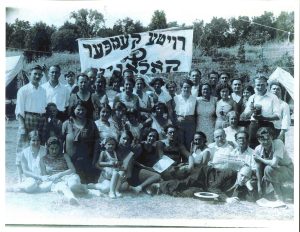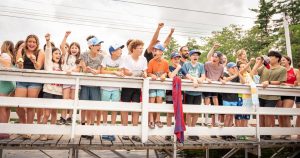I am a camp girl through and through. I’ve spent every school year since I was nine years old, dreaming of reuniting with my camp friends, swimming in the lake, and fulfilling all the silly and meaningful traditions unique to Camp Massad.
I was devastated when our camp, located in the beautiful Laurentians, north of Montreal, was cancelled in the summer of 2020. After the strangeness of the first lockdown, the familiarity of Camp Massad was something that I needed and wanted more than ever before. My first summer in the city in 10 years felt weird, and I was thrilled when I found out that I’d get to spend summer 2021 back at camp and fulfill my childhood dream of being head of waterfront (or in Massad terms, Rosh Agam).
Going into the summer, I knew it would be different than summers past, not only because of my newfound responsibility, but because of necessary COVID precautions that would ensure everyone’s health and safety. However, as soon the head staff and leadership team began our preparations, our major goal became apparent: that this summer wouldn’t be known as “the COVID summer” but just another classic summer at Camp Massad. And although I might be biased, I believe that we succeeded.
The first few weeks were tricky. We were balancing three shifts for mealtimes instead of the usual one, keeping campers bubbled with their own bunks, and not allowing them to pick all their activities as they usually would. And of course, we were masking and distancing when required. Still, everyone felt grateful to be at camp, and you could see it in the way the campers jumped in the lake on days when it was absurdly cold or during pre-camp when staff shlepped bunkbeds without complaining. It was so special to be back and see everyone, even if it was from a distance and behind a mask.
The unique challenges of the first weeks were quickly forgotten when we were allowed to end the bunk bubbles and become one camp-wide cohort. We broke the news to the campers by gathering them before Shabbat at flagpole. We handed out fake diplomas to each of the Malamniks (counsellors in training) that they were told to open on our count. The papers read “take off your masks” and the masks were thrown up like graduation caps as everyone realized that we were now able to embrace our friends for the first time in nearly two years.
That moment was electric. I still get shivers thinking of all the tears of joy shed and the special hugs shared. That night, Kabbalat Shabbat and all the Massad Shabbat songs were sung with so much ruach (energy/passion) that we kept everyone outside of the chadar (dining hall) in fear that the floor might break (and it was hot inside, but please allow for some dramatic effect).
Even the precautions that remained after we became a camp-wide bubble had their own silver linings. Canoe trips to Mont Tremblant Park were traded for early morning canoe expeditions on our own lake, which led to hot chocolate on the docks and memorable pre-breakfast swims.
As staff, we weren’t allowed to leave camp for nights out or days off. At first, I was concerned that it wouldn’t feel as restful with the knowledge that camp was right there, but there were “day off bunks” where counsellors could sleep in and get some space. Without driving to and from Montreal and the stress of figuring out lifts, I found it even more relaxing than in the past, with most of us taking our meals on the docks, spending time in the staff lounge and coming up with a whole list of special activities to do with friends.
This summer offered campers and staff a space to forget about COVID and fostered a new sense of gratitude for the incredible opportunity that is sleep-away camp. But most importantly, it renewed our sense of independence, connected us to nature, taught us new skills, and allowed us to build and reinforce beautiful friendships — all hallmarks of the traditional camp experience — no matter what safety restrictions needed to be implemented.
Talia Kliot was head of waterfront at Camp Massad this summer. She is a student of Journalism and Creative Writing at Concordia University.







